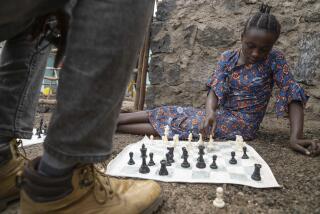Chessmen Play in Parks and Parkas
- Share via
MOSCOW — It’s a classic winter scene, the kind that landscape painters might capture in Bavaria or Boston, but with a distinctly Russian twist.
Deep in the woods, children are sliding down icy knolls, cross-country skiers are gliding between white birches, mothers are pushing strollers, and men in fur hats are . . . playing chess.
Ch-ch-chess, anyone?
In a country where people seem to ward off hypothermia by lining up outdoors to buy ice cream, perhaps it’s not surprising to come across a bunch of guys in parkas pushing pawns in a snowy forest.
The regular games in Moscow’s Timiryazevsky Park underscore a passion for chess in Russia like nowhere else on Earth--one that appears only to be growing in the era of computer chess and the Internet.
From schoolchildren to granddads, ditch-diggers to presidents, practically everyone seems to know how to play “shakhmaty,” and well.
“In Soviet times, the government supported chess because we wanted to show the world we were the strongest and cleverest,” said Ruslan Urtayev, a construction worker who brought his preschool son along to watch him play in the park.
“Now we just play because we love it. It’s all about the beauty of ideas, the beauty of give-and-take,” he said.
For Russians still pained by the loss of the motherland’s status as a world superpower and sports titan, there is beauty too in the continuation of a proud tradition.
The game is believed to have originated in India, but there’s no doubt that the center of chess has been in Russia for some time.
When chess moved to the salons and coffeehouses of Europe, writers Alexander Pushkin, Leo Tolstoy and Ivan Turgenev became aficionados and helped popularize it.
By the start of this century, Russians at the highest level were nuts about chess--a rare sentiment shared by both nobles and revolutionaries. Russia’s last czar, Nicholas II, coined the term “grandmaster.” Not to be outdone, Lenin called chess “gymnastics of the mind.”
The mass development of chess came only after the Bolshevik Revolution, however. With the Communist Party’s sanction, a remarkable reign of Russian dominance began that looks set to continue well into the 21st century.
All but two of the 13 world champions of the last 70 years--and only American Bobby Fischer in the last half a century--have been natives of Russia or the former Soviet Union.
Many of the best grandmasters live here, chess is a staple of many school curricula, and TV sports reports routinely give chess results.
While the Timiryazevsky chessmen were hunched over ice-covered picnic tables one recent Sunday, there also was evidence of Russian chess mania in a more conventional setting.
Just half a mile from the Kremlin, dozens of tournament games were under way in the hushed silence of the Central Chess Club, Russia’s biggest.
Men in stiff blazers, gangly boys in heavy metal T-shirts and a few young women bent over their boards under chandeliers and black-and-white photographs of this century’s world champions.
The path for many of those greats led through this club, including reigning world champion Garry Kasparov, the highest-ranked player ever.
Boris Postovsky, coach of Russia’s national team, expects one of his players, No. 2-ranked Vladimir Kramnik, to succeed Kasparov on the chess throne.
“Just as you could say that the Brazilian character and weather combine to produce soccer players there, you could say the same about the Russian temperament and climate being well suited to chess,” Postovsky said.
The key ingredient to the country’s success may be simply that so many Russians play it now, even from the first grade, he said. The reason is not to breed champions, but rather a strongly held belief that chess is good for you.
“Chess used to be prestigious,” said Valery Chekhov, a junior world champion in the 1970s. “Now, not as much. But children are starting to love it for different reasons.”
The main reason is the use of computers in today’s chess world, which has sparked a resurgence of interest among kids, Chekhov said.
While Kasparov and his predecessors became champions through endless reading and playing, chess experts agree that computers have pushed the game to a higher level--making chess research and previous outcomes much more widely available.
Russia’s bright chess future is visible at a children’s center where Chekhov and his wife, Tatyana, provide free after-school lessons.
Tatyana lectures to an attentive class full of young chess lovers, gesturing with a pointer to a chess diagram taped to the blackboard.
In an adjacent room, kids are immersed in brightly colored computer chess programs. Clicking on the correct answer to a problem prompts a cheery beep.
Ilya Savidov, a gum-chomping 10-year-old, pumps his fist and exclaims, “Yes!” as he racks up more points. He may be a classic example of the next chess generation--kids who like to sit and push buttons at the keyboard and wind up being good players.
Ilya, who has been playing chess for three years, insists that he likes soccer better. But there’s no hiding his zest for the national game.
“There are some nice combinations,” he observes. “You really have to think.”


